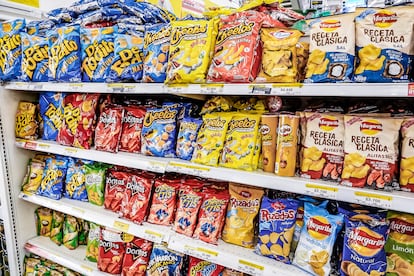The most ambitious ‘health tax’ in Latin America debuts in Colombia
The public health measure imposes an initial tariff of 10% on ultra-processed foods and sugary drinks, which rises to 20% by 2025


For many public health experts, there is no doubt that Colombia’s new taxes on a series of ultra-processed foods — which come into force on Wednesday — are the most ambitious public health measure in Latin America. Other countries in the region have made progress in areas such as regulating the hours in which ultra-processed foods can advertise on television, demanding nutritional labels on products and implementing tax policies aimed at sugary drinks.
But Colombia’s so-called “Junk Food Law,” promoted by civil society groups and included in President Gustavo Petro’s tax reform, is the most complete initiative to date, according to experts. Guillermo Paraje, renowned economist at the Adolfo Ibáñez University of Chile, argues: “In Chile, there are no taxes on food ingredients. What Colombia is doing is quite new, and I would say that it is the most advanced at a regional level and even among the most advanced at a global level, because I do not know of other cases of countries that have imposed taxes on ultra-processed foods in such a comprehensive manner.”
The measure — known popularly as a “health tax” on ultra-processed foods and sugary drinks — has been strongly opposed by large corporations for years. In Colombia, like other countries, policy has been influenced by the heavy hand of the business lobby and the debates around the effectiveness of public health measures. According to the new regulations, the tax on sugary drinks and ultra-processed foods will be gradual. During the remainder of this year, there will be a 10% tax, then 15% in 2024, before reaching 20% in 2025. In the case of beverages, the tax will be adjusted from 18 pesos, depending on the concentration of sugar per 100 milliliters.
The industry is skeptical of the measure. The most popular argument against it is that those most affected will be small shopkeepers and producers with little margin to adapt to ensure their product meet health standards. Critics say it will also hurt the millions of Colombians facing economic difficulties and rising food prices. Inflation skyrocketed between 2021 and 2022, although it is now slowly falling.
Business leaders sent a series of demands regarding the tax, but they were dismissed by the Constitutional Court on October 25. “In Mexico it was the same. In the early years there were industry-sponsored scientific studies to suggest that the sugary drinks tax, which was introduced in 2014, did not work,” explained activist Paulina Magaña, from the Mexican NGO Consumer Power.
Research from the Faculty of Medicine at Colombia’s Javeriana University has shown that hypertension and pre-hypertension are on the rise in Colombia. Just over 40% of the population, both adults and children, suffer from one of these two conditions, which is associated with higher risk of mortality. Studies have also revealed that one of the biggest problems is the high level of salt consumption. For this reason, various medical and civil organizations launched campaigns to reduce the consumption of foods high in sodium, added sugars or saturated fats.
Obesity and overweight figures have also risen in Colombia. In 2021, the Health Ministry estimated that 56.4% of Colombians were overweight. The new measure is an effort to address these issues, but industry leaders are concerned about the categories used to decide which products are taxed.
“A store-bought sausage, for example, which has less meat than additives, was exempt from the tax,” businessman Thierry Ways wrote in a column in the newspaper El Tiempo. In his opinion, the parameters used by the government to categorize products are a “joke,” pointing out that serrano ham was taxed even though “it has two natural ingredients — meat and salt.” Ways argued that not all food “processing” is negative and that the government’s policy should have focused on improving the quality of food.
But health policies introduced in Mexico and Chile offer a different perspective. According to economist Guillermo Paraje, in Chile, “consumption fell of some categories that previously seemed healthy, but were not as healthy as thought.” These categories included some cereals, yogurts and desserts. “This forced the industry to reduce the critical levels of its compounds,” he explains.
Likewise, he cites two studies published in American specialized journals in which he participated. Researchers concluded in 2022 that front labeling on products in Chile did not “change companies’ production costs, nor was it passed on to consumers in final prices.” Chilean pediatrician Lorena Rodríguez, who was head of nutrition in Chile’s Health Ministry, explains that industry usually adapts to the context. Companies are forced to reduce levels of sugar, calories and sodium and the public refrains from buying more expensive products that also have harmful effects on health.
Sign up for our weekly newsletter to get more English-language news coverage from EL PAÍS USA Edition
Tu suscripción se está usando en otro dispositivo
¿Quieres añadir otro usuario a tu suscripción?
Si continúas leyendo en este dispositivo, no se podrá leer en el otro.
FlechaTu suscripción se está usando en otro dispositivo y solo puedes acceder a EL PAÍS desde un dispositivo a la vez.
Si quieres compartir tu cuenta, cambia tu suscripción a la modalidad Premium, así podrás añadir otro usuario. Cada uno accederá con su propia cuenta de email, lo que os permitirá personalizar vuestra experiencia en EL PAÍS.
¿Tienes una suscripción de empresa? Accede aquí para contratar más cuentas.
En el caso de no saber quién está usando tu cuenta, te recomendamos cambiar tu contraseña aquí.
Si decides continuar compartiendo tu cuenta, este mensaje se mostrará en tu dispositivo y en el de la otra persona que está usando tu cuenta de forma indefinida, afectando a tu experiencia de lectura. Puedes consultar aquí los términos y condiciones de la suscripción digital.








































